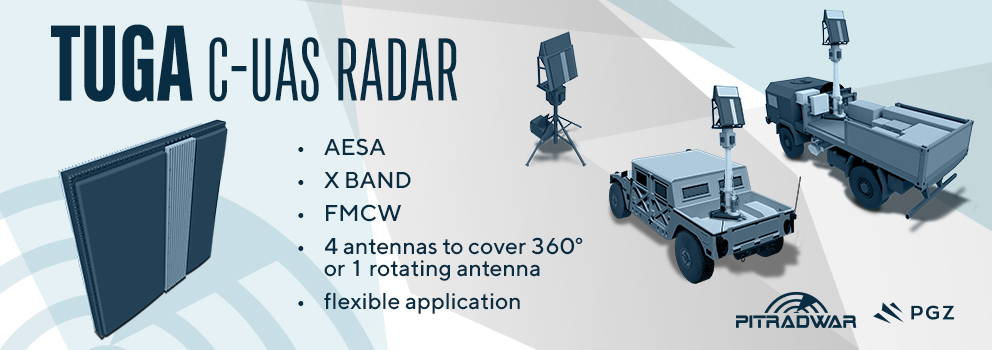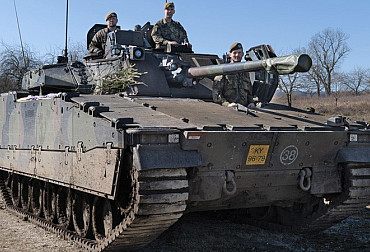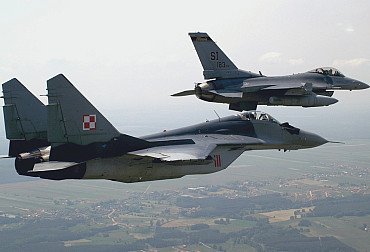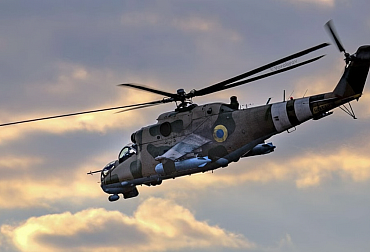The Defence Committee discussed modernisation projects for the "heavy brigade" and logistic support priorities
During its last meeting this year, the Defence Committee returned to the strategic project for the acquisition of F-35 Lighting II aircraft, which has been approved by the Government and is now awaiting the signing of the contract. The second topic was the current situation at the state-owned company VOP CZ, which has been struggling for a long time, leading to the dismissal of the company's CEO Marek Špok by Defence Minister Jana Černochová during her visit to VOP CZ. The Committee also worked in private mode, dealing with information on developments in Ukraine and Israel, as well as information from the MoD on the level, objectives and priorities of logistic support. As noted at this year's Commanders' Assembly or mentioned in the recently adopted Czech Defence Strategy 2023, logistics is one of the Army's priorities for ensuring alliance missions and homeland security.
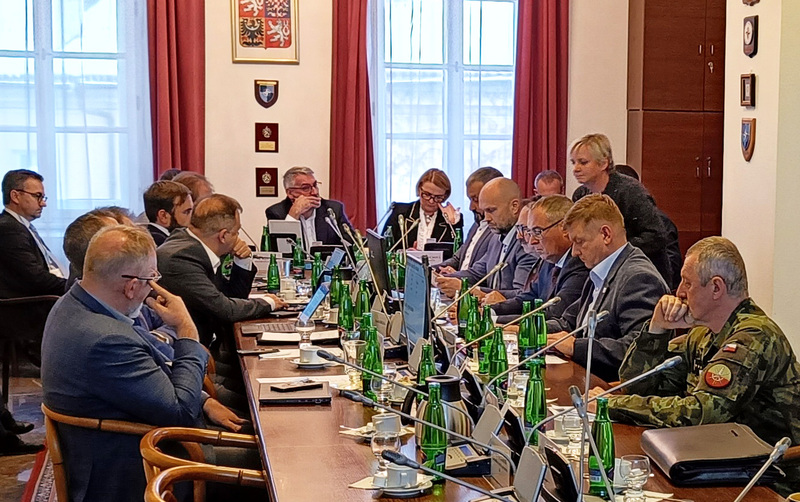
Members of the Defence Committee returned to the recapitulation of the development of the project for the purchase of MINIMI machine gun kits for the needs of the Czech Army, which they subsequently took note of. Minister of Defence Jana Černochová considers the purchase of machine gun kits from the Belgian manufacturer FN HERSTAL as one of the key programmes for the rearmament of the ground forces of our army. At that time, the Ministry of Defence awarded a public procurement contract for the purchase of machine gun kits under the negotiated procedure with publication. "Any supplier meeting the defined basic conditions could apply. A framework agreement for the supplies was concluded with the supplier selected under the tender procedure, with a value of CZK 1.127 billion, including VAT. In connection with the Russian invasion of Ukraine, in the spring of 2022, it was decided to increase the maximum volume of the framework agreement to a total of CZK 1.465 billion, including VAT. I would like to point out that there was no increase in the unit price of the machine gun kits, but only in the financial framework. Simply put, we were able to buy more goods for the same unit price. Deliveries started in 2022 and to date more than 900 sets of machine guns have been delivered, including extensive accessories such as optical equipment for day and night firing, spare parts and others," the Minister said on the subject, adding that deliveries will continue next year when the last 581 sets of machine guns will be delivered and the value of the framework agreement will be almost exhausted.
The Minister also pointed out that this contract was the subject of a complaint to the Office for the Protection of Competition, but all suspicions and accusations were successfully refuted by the Ministry of Defence, including the latest case of filing a motion for the order of execution, which has now been suspended without any validity, since the Ministry has fulfilled all its obligations, according to the court's verdict. "I am convinced that the contract was well prepared, and I say this knowing that it was prepared under my predecessor and current chairman of the committee, Lubomir Metnar, and signed only in the first days of our tenure at the ministry," Cernochová said.
In his evaluation of the tender, MP Radovan Vích recalled some of the SAO's findings, the resulting price per unit, the erroneous specifications, the entire genesis of the purchases, and also said that they paid far less for comparable weapons in Norway and Japan. On the other hand, Lubor Koudelka, chief director of the armaments and acquisitions section of the MoD, defended the ministry's approach, pointing out that at this stage of the purchase the ministry had asked the army to submit specifications for the final numbers of MINIMI machine guns. This also established both the above-mentioned frameworks for the execution of the tender before and after the start of the conflict in Ukraine. The price of one machine gun, he said, does not even account for one-third of the cost of the entire kit, as the total contract consists mainly of optics, spare parts, training and other accessories. Regarding the final price, Director Koudelka said that the procedure followed the law. "The conclusion of this expert committee is that this is the price established, which is exactly according to the law and this allowed the contracting authority to sign this contract," Koudelka said.
During the next part of the meeting, Defence Minister Jana Černochová together with Chief of the General Staff of the Czech Armed Forces Lt. Gen. Karel Řehka presented the latest information regarding the development of the 7th Mechanised Brigade's capabilities in the form of the battle tank concept, the acquisition of tracked armoured personnel carriers and the modernisation and replenishment of the Pandur armoured personnel carrier. The Minister recalled the three main modernisation projects for the "heavy brigade", namely the acquisition of CV90 tracked armoured personnel carriers, the main battle tank project and the immovable infrastructure project in Přáslavice. "Of course, these projects are not in a vacuum and comprehensive construction and modernisation is also supported by other modernisation projects of the Czech Army, such as the acquisition of 155 millimetre ammunition for NATO guns, the acquisition of automated fire control systems and the acquisition of engineer and communications equipment and material. There are also smaller projects such as the acquisition of small arms, night vision and ballistic protection equipment. Another important project, which has an overlap not only between the units forming the Seventh Brigade Task Force, is the MBK (Modular Battle Kit) project," the minister said.
General Řehka reminded on the topic that the Czech Republic signed up to the commitment to build a heavy brigade already in 2016 by adopting the NATO Capability Target, which was further addressed in the Concept for the Construction of the Army of the Czech Republic until 2030 and was further elaborated in the concept for the construction of ground forces. "This target is also addressed in the currently approved CFACR to 2035. At the same time, it should be said that the 2021 State Defence Planning Questionnaire states that the Czech Republic will be able to complete the heavy brigade capability only after 2031," General Řehka said, adding that NATO has taken note of this fact.
The strategic project to acquire the tracked infantry fighting vehicle and its CV90 modifications is one of the two main pillars of the Seventh Brigade's modernisation. The other major project to achieve the required capabilities of this brigade group is the strategic project for the acquisition of new main battle tanks. The Czech Army currently operates mainly T-72M4 CZ and T-72M tanks. The combat capabilities of these tanks, especially in the area of firepower and armour protection, are very limited for conducting combat operations in today's conditions. Moreover, the 125 millimetre calibre ammunition used is not standardised within NATO. "In addition to the aforementioned types of tanks, the Czech army currently has fourteen Leopard 2 A4 tanks, which were part of the German government's donation to replace the T-72 tanks donated to Ukraine," the general added. After getting acquainted with the qualities of the Leopard 2 A4 tank, the Chief of General Staff would like to see more variants of this armoured vehicle.
General Řehka also recalled in his speech that the first steps towards the rearmament of the Czech Army with a new main battle tank were initiated in 2017, when the applied defence research project "TANK - Development of the Czech Army's tank troops after 2025" was commissioned with the aim of preparing analytical material that will be used as one of the bases for the future decision of the Czech Army Command on the further development in this area. "The requirement was to analyse the probable future battlefield space, identify the capabilities of tanks after 2025 depending on their probable use, propose the optimal organisational structure of tank units, their combat support and combat support, and propose options for rearmament of the tank troops of the Army of the Czech Republic after 2025. The concept of the Czech Armed Forces construction valid at the time the study was commissioned foresaw a decision on the further course of action in 2025. At that time, implementation after 2030 was envisaged. The study was handed over to the Army of the Czech Republic in 2020," the Chief of General Staff specified, adding: "I want to say that the purpose of the study was not to select a specific tank. The purpose was to assess the future of the tank army, whether to continue it and what path to take. In parallel, discussions were already underway in 2017 on the way forward to keep the T-72M4 CZ tanks operational until their replacement, which was originally planned for 2030. Due to the deteriorating availability of spare parts and the discontinuation of production of some components, a decision was made to carry out a technical evaluation of the T-72M4 CZ tanks. In other words, due to the development and shortage of components, it was decided that they would need to be evaluated in order to serve and provide capabilities until 2030."
During the discussion of this point, it was then added that the contract for the implementation of the technical evaluation of the T-72M4 CZ tanks was signed in 2020, the technical tests will take place in 2024 and subsequently a total of 30 T-72M4 CZ tanks and 3 recovery tanks will be technically evaluated by the end of 2025. As a next step, the Industrial Cooperation Section of the Ministry of Defence commissioned a feasibility study for the new generation main battle tank. The Army received the study in March this year. "In view of the need to strengthen the defence capability of the Czech Republic and the North Atlantic Alliance in the light of the conflict in Ukraine and the development of Russia's behaviour, the Government of the Czech Republic, in its Resolution No. 387 of 24 May 2023, authorised the Minister of Defence, Jana Černochová, to negotiate on joining the joint procurement of main battle tanks being prepared by the German Ministry of Defence, which will result in the acquisition of completely new capabilities, achieve compatibility with NATO standards and reduce dependence on Soviet-made equipment," said Lt. Gen. Řehka.

According to him, the Army plans to procure up to 77 tanks of all variants in the years 2027-2030 for the rearmament of units of the 73rd Tank Battalion and partial rearmament of the 153rd Engineer Battalion and the Training Command - Military Academy, including materials and services to start operating the new equipment, to ensure maintenance and repairs at a high level, including initial training of instructors and specialists of the Army of the Czech Republic. This is the minimum option necessary to rearm the 73rd Tank Battalion to the NATO standard structure and arm the engineer units with modern tanks. It is required to acquire 61 tanks with an option for 16 more. If additional funds are allocated, the option will be used to increase the capabilities of the independent 73rd Tank Battalion by creating an additional tank company, which then fits in with the provision of tank support to the next brigade task group.
Regarding the next item on the committee's agenda, concerning the strategic project for the acquisition of 5th generation F-35 aircraft, Defence Minister Černochová submitted a proposal to MPs for inclusion in the list and plan of strategic projects of the Czech Armed Forces, which will be submitted to the government for consideration. The material is preliminary as it has not yet gone through the inter-ministerial comment procedure, so it may change in parts. Another strategic project presented by the Minister is the acquisition of the Embraer C-390 Millennium medium transport aircraft, where market consultations are still underway at the moment. The Minister said that based on the demands voiced at the plenary session of the Chamber of Deputies, she would introduce the F-35 project to the Chairman of the ANO movement Andrej Babiš, as well as to the Chairman of the ANO parliamentary club Alena Schillerová and the Deputy Chairman of the Chamber of Deputies of the Czech Republic Karel Havlíček. The meeting is expected to take place on Monday 11 December. After criticism from some opposition MPs, who pointed in particular to the way the project was communicated, the MPs did not adopt any resolution.
The continuation of the aborted discussion of the current situation in the state-owned enterprise VOP CZ from the previous committee meeting also followed a similar course. The minister informed the committee that she had dismissed the company's CEO Marek Špok from his post on 1 December. She also said that the Supervisory Board had asked the management of the state enterprise to submit proposals for improving its management. However, the proposal was subsequently not accepted by the supervisory board at its meeting in November because it was unrealistic. The Supervisory Board therefore invited the SOE to evaluate these proposals at its next ordinary meeting on 13 December. At the same time, the management of VOP CZ should submit a business and financial plan for 2024 to the Supervisory Board. After receiving the suggestion from the employees of the enterprise and on the basis of information on the state of the economy, the Ministry of Defence launched a public audit in the state enterprise in October, which will be completed by the end of 2023, given the scope of the audited area. The final report will then be ready by the end of January 2024. According to the findings of the Minister of Defence, the personnel situation in the state enterprise has not improved. "We also approached the union representative who went to the enterprise together with me and another member of the supervisory board with Mr. Ťok. There is nervousness among employees about the economic development of the enterprise, which will affect the contract work and employment of all tribal employees," said the minister, who also toured the industrial premises of the enterprise and spoke to employees during her visit. The company is undergoing a transformation whereby military production will be the primary focus for the company after many years of civilian dominance. According to the minister, the technical director of VOP CZ, Martin Šturala, who is also a member of the supervisory board, will be temporarily in charge of the company. He will be supported by another member of the supervisory board and former transport minister Dan Ťok. The members of the committee have repeatedly declared that they want to continue dealing with the situation at VOP CZ, especially after the completion of the audit of the company. They therefore took note of the Minister's information but, as at the previous meeting, suspended the discussion of the overall situation in the state enterprise until the final report of the audit was known.
As part of our regular questionnaire, we asked the following question to the Committee Members this time: How significant an investment will the Ministry of Defence, or the Czech Armed Forces, have to make in the logistical support of the Czech Armed Forces and NATO troops following the recently adopted Defence Strategy 2023?
Lubomír Metnar (ANO), Chairman of the Committee
This question must be put to the representatives of the Ministry of Defence. We must realise that the Czech Army has internal debt in all directions, including logistics. Now the Ministry of Defence must use the financial resources that have increased by leaps and bounds and strengthen the Army of the Czech Republic in all directions, including logistics, which performs an indispensable function within the army.
Jan Hofmann (ODS), Vice-Chairman of the Committee
Today we discussed this topic in the Defence Committee, but the meeting was held behind closed doors. I can say that there will be a significant increase in funding, in the order of hundreds of percent. The biggest increase in funding will be in the area of ammunition procurement. The funding will increase gradually over the years.
Stanislav Blaha (ODS), Member of the Committee
In the newly adopted Defence Strategy, the Government has clearly declared and described who is the greatest threat to our country and how we will counter this threat. We can say quite openly that Russia, with its aggressive war policy, represents a direct military enemy for the Czech Republic, the EU and NATO. As part of its membership of NATO, the Czech Republic has committed itself to the collective defence of its territory and that of its allies. Collective defence is also the only way we can stand up in the event of a conflict. The aim of modernising the Czech Armed Forces, but also the whole of NATO, is to have our armed forces so strong that they can deter the enemy from attacking us. This presupposes that in the event of an escalation of the situation, allied troops will move in on NATO's eastern flank. The majority of the allied forces would go through our territory, and further modernisation of the armed forces, as well as of the other branches of government and society, must be adapted to this. The defence of the state is not only based on the MoD and the Armed Forces, but it cuts across all sectors and the whole of society. Therefore, investments within the MoD should go primarily to the development of infrastructure related to Host Nation Support (HNS), i.e. the ability to provide facilities for allied soldiers on our territory. We must also invest in the further development of the AZ and, in particular, the mobilisation measures that are also linked to the provision of HNS. Investing in these areas must not, of course, in any way limit the modernisation and development of the Army as set out for the next period. In the long term, we are talking about larger units, up to tens of billions of CZK, which must be directed in this direction within the MoD. We are talking here about a large range of necessary measures in which we must invest a large amount of resources. However, thanks to the approval of the law on the financing of the army and the long-term predictability of the MoD budget, we are assured that the necessary part of the funds will be spent each year on building and implementing these necessary measures.
Petr Liška (STAN), Member of the Committee
Logistics support has been very noticeably underfunded in recent years, so it will have to invest heavily in all the components it provides, including consumable supplies. In addition, as a result of the current security threats in Europe, it will have to build up a larger stock of everything, which will require a build-up of storage capacity, which would also need to be built up for the procurement of consumables and for the newly acquired equipment in the upcoming acquisitions. It is, therefore, good that after lean years, the logistics section budget will grow by tens of percent per annum, enabling the commitment to allocate 2% of GDP to the MoD budget to be fulfilled.
Radovan Vích (SPD), Member of the Committee
If the priority task is to build a well-armed, equipped, trained and combat-sustainable armed forces deployable in collective defence operations, then operational preparation of the national territory of the Czech Republic is also needed. So far, there are no funds allocated for this, although the Ministry of Defence is trying to do so within the eligible costs within the budget of the Ministry of Transport and the SSHR so that it is included in the 2% of GDP defence expenditure. The next task is then to ensure the reception, movement and support of potentially large numbers of allied forces, or host nation support (HNS). However, a condition for the Czech Republic's defence capability is also the involvement of all the necessary public administration bodies and society as a whole, including the reserves and the defence industry at the time of declaring individual states of crisis, the ability to deploy its armed forces in war, the mobilisation system, the necessary infrastructure and the procurement of material stocks. The Ministry of Defence and the Army of the Czech Republic are not prepared for this and will not be for a long time. Almost everything from the warehouses has been taken to Ukraine, and the priority is the purchase of overpriced American F-35 fighter jets, the acquisition of which will swallow up the annual expenditure for the need to ensure logistical needs and replenish stocks of weapons, equipment and material for the eventual mobilisation and training of reserves. Add to this a long-underfunded military in the hundreds of billions of crowns and it will take decades. We are talking on the order of trillions of crowns that will be needed to achieve these Defence Strategy objectives, which is for the several terms that this current government will commit to future governments.
